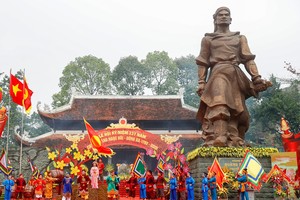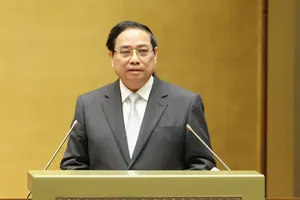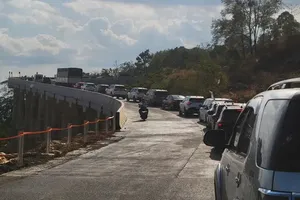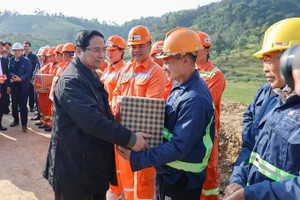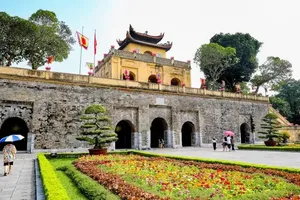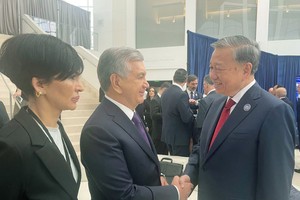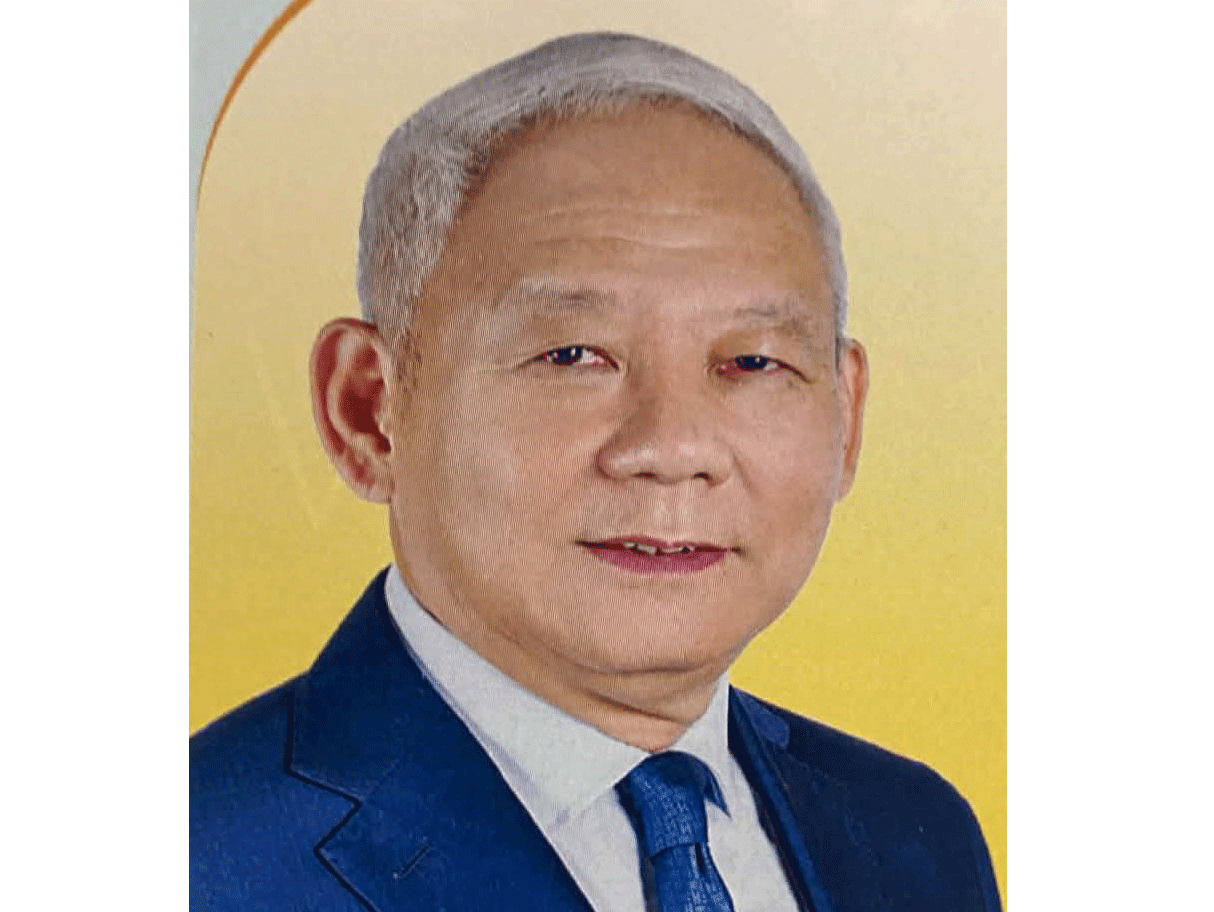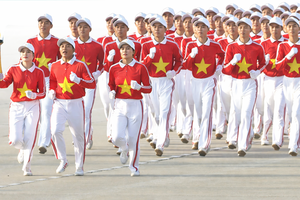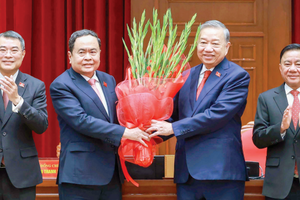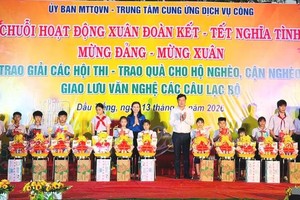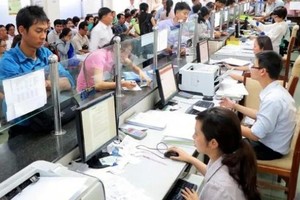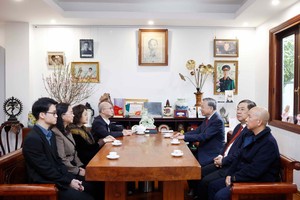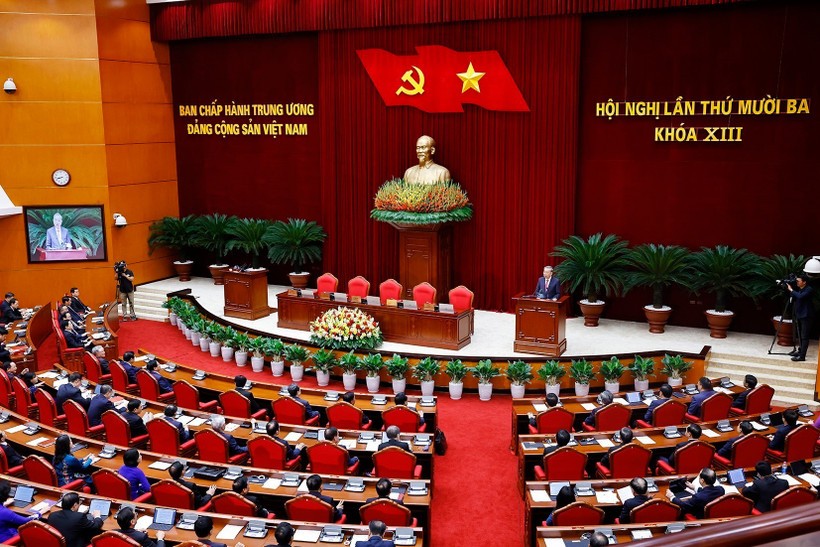
The following is a translation of his speech.
"Members of the Politburo, member of the Secretariat, members of the Party Central Committee,
Distinguished delegates,
The 13th meeting of the 13th Party Central Committee has fulfilled all the planned agenda. Each issue was meticulously prepared, thoroughly discussed, and resolved with high consensus, including many "backbone" matters directly related to the success of the 14th National Party Congress, the goals of fast and sustainable development, and the improvement of the people's living standards.
Between the 12th and 13th plenums, the Politburo worked with urgency and determination, holding ten meetings to deliberate on 88 issues and issue 16 conclusions for timely orientation and institutionalisation of the outcomes of the 12th plenum and the resolution of the 13th National Party Congress, which is now in the “accelerating and finishing” stage. The focus was on preparations for the Party congresses at all levels leading up to the 14th National Party Congress, particularly the draft documents and personnel planning; preparations for the elections of deputies to the 16th National Assembly and People’s Councils at all levels for the 2026–2031 tenure; the reform of the Party building and personnel work; the issuance of a standard framework for positions under the management of the Politburo and Secretariat and for leaders and managers at all levels; the quarterly evaluation of personnel and quality of grassroots Party organisations’ operations; the promotion of socio-economic development and care for people’s life quality; the removal of institutional bottlenecks, the completion of the two-tier local administration model, the continued streamlining of the three-tier political system, the establishment of criteria for administrative unit and city classification; the strengthening of the fight against corruption, wastefulness, and negative phenomena; the consolidation of national defence and security; proactive diplomacy and integration; and effective information and communications work.
The 13th meeting of the Party Central Committee held frank and scientific discussions, achieving high consensus on many important policies and decisions. Four key outcomes can be summarised as follows:
First, the Party Central Committee approved the documents to be submitted to the 14th National Party Congress; agreed to nominate personnel for the 14th Party Central Committee and its Inspection Commission; and gave opinions on the timing, content, agenda, working regulations, and election regulations of the 14th National Party Congress with the principle of ensuring compliance with the statutes, innovation, scientific approach, effectiveness, and practicality. Particularly, the content of the documents was designed to be concise and substantive, with clear orientation towards institutional, infrastructure, and human resources breakthroughs, digital transformation and green transition, regional connectivity, and national self-reliant and sustainable development.
Second, the Party Central Committee adopted a conclusion on the report of the implementation of the 2025 socio-economic development plan and reaffirmed the determination to reach the remaining targets of the 2021–2025 plan, laying the groundwork for the 2026 socio-economic and 2026–2030 financial-budgetary plans with priority to macroeconomic stability, public debt safety, development investment, and social security.
Third, it identified institutional bottlenecks to be removed within the Party Central Committee’s jurisdiction; and agreed on mechanisms for periodic monitoring, inspection, and evaluation, clarifying the accountability of leaders, and encouraging those who dare to think and act for the common good.
Fourth, delegates reached consensus on major orientations and methods for implementing the conclusions of the 13th meeting of the Party Central Committee and the Politburo, and established the guiding principle: “discipline comes first, resources follow, and results are the meter."
The Party Central Committee also made decisions on several issues related to personnel affairs under its jurisdiction.
The overarching spirit of this meeting is to take results as the meter, the people as the center, discipline as the foundation, and innovation as the driving force. Following straightforward, democratic, and responsible discussions, the Party Central Committee agreed on nine major orientations:
First, it is a must to make thorough preparation for the 14th National Party Congress: (i) continuing to refine and perfect the documents that must be concise, profound, reflect the strategic vision, affirm the three strategic breakthroughs – institutions, infrastructure, and human resources – under new conditions, clearly define digital transformation – green transition and regional – smart city linkages, and pay due attention to the maritime and cultural economies, with measurable targets and realistic implementation roadmaps. (ii) Personnel selection must be made based on virtue, capacity, prestige, integrity and efficiency with no tolerance for persons lobbying for position or power, committing corruption or negative phenomena, or showing no desire for progress; the emphasis remains on promoting leadership by example, properly using those with real talent, and placing the right people in the right positions and at the right time.
Second, it is important to fulfill and surpass the remaining targets laid out in the resolution adopted at the 13th National Party Congress, the 2025 socio-economic development tasks, and the 2021–2025 plan. It is a must to continue maintaining macroeconomic stability, controlling inflation, and creating room for investment, consumption, and export; accelerate public investment disbursement in an accurate, timely, and efficient fashion; strongly improve the business environment, cut compliance costs, and expand single-window public services based on integrated data.
Third, competent sides must actively prepare for the 10th session of the 15th National Assembly and the elections of deputies to the 16th National Assembly and the People’s Councils at all levels for the 2026–2031 tenure. It is necessary to review the legal framework and processes; ensure democracy, discipline and transparency; and proactively make personnel and organisation plans so that the elections are truly a broad political event that strengthens public trust.
Fourth, another task is to perfect the two-tier local administration model, press on with reorganising and streamlining the three-tier political system. Focus should be placed on digitalising processes, simplifying procedures, expanding power decentralisation and delegation with clear accountability, and measuring success through citizen and business satisfaction. At the same time, it is important to promptly complete the scheme on standards for and classification of administrative units and urban areas in a comprehensive, interconnected, and feasible manner, creating new development space for the grassroots level so that local administrations not only perform duties or serve the people but also become an endless source of creativity for national development.
Fifth, it is necessary to remove institutional bottlenecks under the jurisdiction of the Party Central Committee, focusing on issues related to land, investment, construction, the environment, and energy; make the corporate bond and real estate markets healthy, and strengthen market discipline and confidence; encourage public-private partnerships and technological innovation, unleash social resources, reinforce the leading role of the state economic sector, and boost the role of the private sector in national development.
Sixth, it is a must to strengthen the fight against corruption, waste, and negative phenomena with the principle of “no forbidden zones, no exceptions”; accelerate inspections, audits, investigations, prosecutions, and trials of cases under the supervision of the Central Steering Committee for Corruption, Wastefulness and Negative Phenomena Prevention and Control; and protect those who dare to think and act for the common good, and tighten Party discipline and governance to ensure a stronger and more sustainable fight.
Seventh, it is necessary to maintain national defence and security; act proactively and effectively in foreign affairs and integration; uphold national interests, and ensure territorial integrity, independence, and sovereignty; proactively adapt to new trade policies of major partners; diversify markets, products, and supply chains; and maintain a peaceful, stable, cooperative, and development environment.
Eighth, we should step up communication, guidance, and information dissemination to boost public trust in the efforts to protect, build, and develop the country; focus on promoting policies, initiatives, innovative approaches, and examples of good people and good deeds; synchronously deploy communication on the implementation of resolutions from Party congresses at all levels and the preparation for the 14th National Party Congress.
Ninth, it is a must to steadfastly and consistently implement the conclusions of 13th meeting of the 13th Party Central Committee and the Politburo since the 12th Party Central Committee, as well as upcoming conclusions. Every task must have clear objectives, timelines, resources, responsibilities, and monitoring; while reports must be submitted on time, and progress and results made public for public oversight.
Comrades,
To turn major policies into concrete results, we need decisive, transparent, and consistent actions. I propose focusing on three priorities, three transparencies, and one measurement standard:
Three priorities: To quickly institutionalise the resolutions and conclusions of the Party Central Committee, the Politburo, and the Secretariat; implement rigorously in accordance with weekly, monthly, and quarterly schedules; and conduct regular monitoring and supervision to promptly remove obstacles.
Three transparencies: To publicise progress, responsibilities, and results so that the public can monitor and join.
One measurement standard: The living standards and trust of the people, specifically, better public services, wider employment and business opportunities, reduced time and procedural costs, a safer and more peaceful society, and more prosperous and happier people.
For local Party committees and authorities, especially at the provincial and municipal levels: To focus on achieving real results rather than just following “procedures.” Each task must have a clear output, a responsible party, and a defined deadline; from "strength at each facility and locality" to "strength by region"; improve planning and connect transport, digital, and energy infrastructure to form economic hubs and leverage urban economic models; move from general “care” to “practical care”. Social security, healthcare, and education must reach the right people, meet actual needs, and be timely; upgrade worker housing and public services; leave no one behind; strive so that every individual and family receives comprehensive care - both mentally and materially.
We have completed the agenda of the 13th meeting of the 13th Party Central Committee with renewed momentum, trust, and responsibility. Significant opportunities are opening up: positive results in 2025, a smoothly operating three-tier administration system, mutually reinforcing development spaces after restructuring, and seven strategic resolutions of the Politburo paving the way. At the same time, challenges remain substantial: strategic competition, changing international policies, climate change, and the demands of digital and green transformation. Our resilience, intelligence, and aspirations will enable us to overcome these challenges, seize opportunities, and ensure the country progresses day by day.
I request each member of the Party Central Committee to continue setting an example by “speaking less, doing more, acting decisively and effectively;” resolutely avoiding formalism, dogmatism, and passing the buck. Let us uphold discipline, unlock resources, foster innovation, and accelerate implementation to achieve breakthroughs in the remaining months of 2025 and build strong momentum to enter into 2026 and the years ahead.
On behalf of the Politburo and the Secretariat, I sincerely thank members of the Party Central Committee, supporting agencies, and reporters from news and media agencies for their dedicated work, which has contributed to the overall success of the meeting.
With steadfast faith and strong determination, I hereby declare the closing of the 13th meeting of the 13th Party Central Committee. I request all comrades to promptly implement the meeting’s conclusions and to thoroughly prepare for the Party Central Committee's 14th meeting, and especially for the 14th National Party Congress.
In light of the recent severe and complex weather events, I would like to express my condolences for the losses of life, health, and property suffered by people in storm- and flood- hit areas. I also commend the Government, relevant agencies, local authorities, the military, police, youth forces, and relief organisations for their tireless efforts and sacrifices, risking danger to save lives, protect public and private property, and promptly address difficulties in the affected regions.
Members of the Party Central Committee, especially local leaders, must urgently focus on directing efforts to prevent and respond to the severe consequences of storms, floods, landslides, and inundation occurring in many areas, particularly following storms No. 10 and No. 11. It is necessary to mobilise the entire political system, armed forces, and the people to protect lives and property of the people, ensuring that no one is left hungry, homeless, or without medical care. It is a must to focus efforts on overcoming difficulties so that students can return to school as soon as possible, while proactively preparing response plans for weather developments that are forecast to be very complex and harsh.
Once again, I wish all of you good health, happiness, and success.
I sincerely thank you all.
